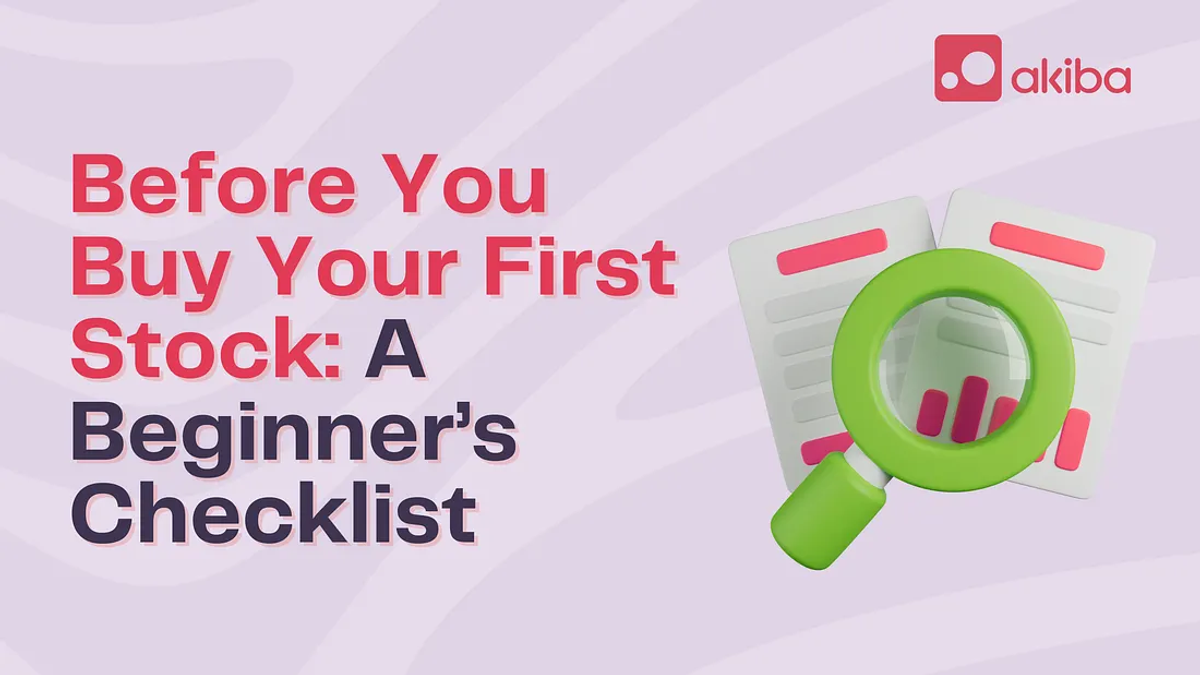The stock market can be an exciting place — offering opportunities to grow wealth, build financial freedom, and beat inflation over time. But it’s not a place you want to jump into blindly. Before you buy your first stock or ETF, there are essential steps to take to protect yourself, your money, and your peace of mind.
This guide walks you through exactly what you need to do before diving into stock investing — especially if you’re starting out in Nigeria.
1. Get Clear on Your Financial Goals
Before anything else, ask yourself: Why am I investing?
Do you want to grow your wealth long-term? Save for a house in five years? Supplement retirement fund? Fund your child’s education?
Your goals will determine:
• What kinds of stocks you buy
• How much risk you can tolerate
• How long you’re willing to stay invested
For instance, If your goal is retirement 20 years from now, you can take more risks. But if you need the money in 2 years, you should reconsider stocks and look at safer options like fixed income.
2. Build an Emergency Fund First
Stocks can go up and they can crash. That’s why it’s risky to invest money you might need urgently. Before investing, make sure you have:
• 3 to 6 months of living expenses saved
• Kept in a low-risk, accessible account (e.g. high yield savings account, money market fund)
That way, if your car breaks down or you lose your job, you don’t have to sell your stocks at a loss just to survive.
3. Pay Off High-Interest Debt
There’s no point earning 10% on stocks if you’re paying 25% interest on a loan. Focus on clearing high-interest debts before investing. These debts drain your finances and compound against you.
If you have low-interest debt (e.g. student loans, mortgages), you can invest while paying them off — just make sure you’re not overleveraged.
4. Understand the Basics of How Stocks Work
A stock is simply a piece of ownership in a company. When you buy shares, you become a part-owner of that business. If the company grows, the value of your shares may increase — and they might also pay dividends.
But before you start picking stocks, understand:
• What determines a stock’s price
• The difference between growth and value stocks
• What an ETF is, and how it differs from mutual funds
• What affects the stock market (interest rates, inflation, company performance)
Use free resources like the Akiba Blog and Newsletter
There is also platforms like:
• Nairametrics
• Business Day
• NGX Blog
5. Assess Your Risk Tolerance
Can you stomach your investment dropping by 20% without panic-selling?
Every investor has a different level of risk they can handle. Your:
• Age
• Income
• Financial responsibilities
• Personality
…all affect how much risk is suitable for you. If you’re not sure, use free online risk tolerance quizzes or speak to a certified financial advisor.
6. Choose a Strategy: Active or Passive
Are you going to:
• Pick individual stocks yourself (active)?
• Or invest in baskets of stocks via ETFs (passive)?
Beginners are better off starting with passive investing.
ETFs like the NGX 30 ETF or Vetiva’s Sector ETFs allow you to invest in a group of companies with one purchase. It reduces the risk of putting all your money in one company and requires less research.
7. Start Small & Learn As You Go
You don’t need a fortune to get started. Some Nigerian platforms allow you to start with as little as ₦5,000.
Start small while you’re still learning. It’s okay to make mistakes with ₦5,000, it’s painful with ₦500,000.
8. Open the Right Investment Account
To trade Nigerian stocks, you’ll need:
• A CSCS account (handled by your broker)
• A stock brokerage account (direct with firms like Vetiva)
Some brokers also offer access to mutual funds or fixed income products — allowing you to diversify from the get-go.
9. Know the Fees & Taxes
Brokerage fees, transaction charges, stamp duties, and withholding taxes on dividends all apply. NGX trading fees are typically around 1.35% per transaction, dividends are taxed at 10% withholding
Make sure you understand what fees apply so they don’t eat into your returns.
10. Start Tracking & Reviewing Your Portfolio
Once you start investing:
• Monitor your portfolio quarterly
• Rebalance as needed (if one stock is now over 40% of your portfolio)
• Stay informed through newsletters and market updates
But don’t obsess over daily price swings — it encourages emotional investing. Think long-term, always.
Final Thoughts
Stock investing can be a powerful wealth-building tool, but it only works if you prepare well.
Set your financial foundation, learn continuously, start small, and grow with experience.
And most importantly — investing is personal. Just because a stock is trending online or your friend made 2x on a foreign stock doesn’t mean it’s right for you.
Be intentional. Be informed. Be patient.




